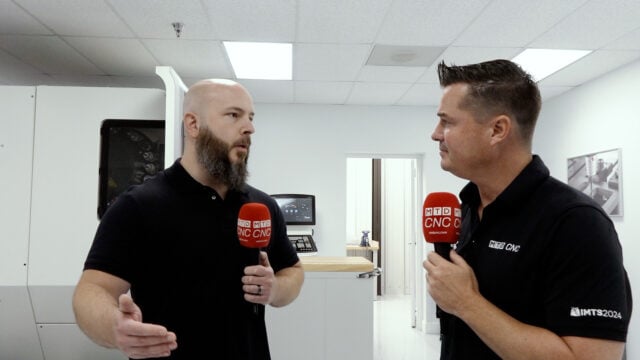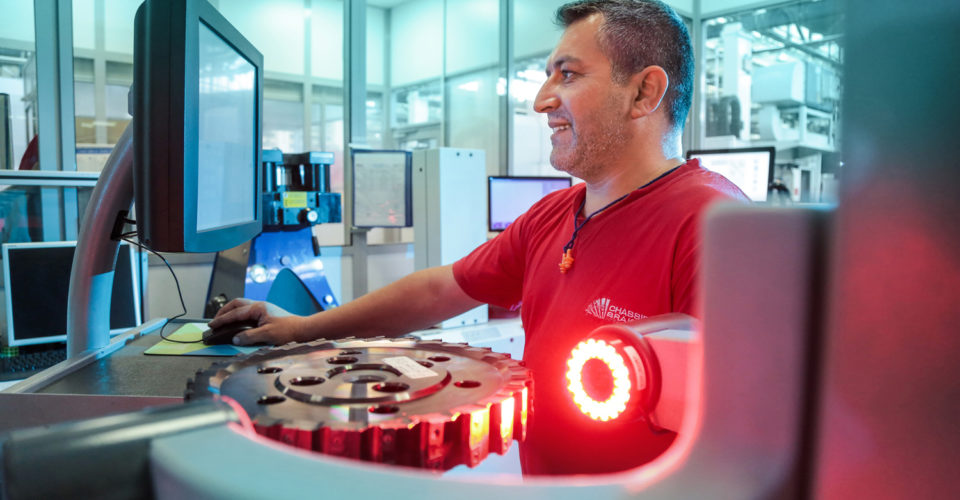
They’re solving some of the biggest challenges with aerospace parts.
MAPAL is a well-known name in the automotive industry, and what they’re doing for the R&D…

MAPAL takes over tool management at Hitachi Automotive Systems Group in Poland, Mexico and Turkey
For manufacturing companies, procuring and preparing tools requires a great deal of time and effort that demands both capacity and competence. For that reason, the Hitachi Automotive Systems Group has entrusted tool management for the entire brake manufacturing process at three of its locations – in Mexico, Turkey and Poland – to MAPAL. By doing so, the company benefits not only from tool management but also from the opportunities provided by digital connectivity.
Chassis Brakes International has been part of Hitachi Automotive Systems since 2019. The acquisition made Hitachi Automotive Systems one of the world’s largest brake manufacturers. “In Hitachi Automotive Systems’s Brake Business Unit , we manufacture disc brakes, drum brakes, electric parking brakes and rotors,” says Hubert Klehenz, the company’s global sourcing director for braking systems. The products are used in cars, light commercial vehicles and two-wheeled vehicles.
At its three factories in Mexico, Poland and Turkey, Hitachi Automotive Systems Group primarily manufactures disc and drum brakes. “We have been successfully working with the Turkish factory in Bursa for 13 years,” recalls Frank Stäbler, Head of Tool Management Services at MAPAL. Over time, the two companies expanded their collaboration. “Following our work at the Turkish factory, Hitachi Automotive Systems Group entrusted us with the tool management for its facility in Wrocław, Poland,” says Stäbler. Their most recent partnership is in Querétaro, Mexico. In 2017, when it was still operating as Chassis Brakes International, the company opened a completely new plant there.
Mastering global challenges with worldwide on-site support
Hubert Klehenz’s team was looking for a partner company that would be able to take over complete responsibility for tools at the plant in Mexico: “In order to deal with global challenges and global projects, we need a tool-management provider that can support us worldwide,” says Klehenz. Brake manufacturer’s main concern was finding a provider to work to the same standards as they themselves did – and deliver at a consistently high quality.
“Brakes are among the most critical safety features of every vehicle, and they need to operate perfectly under all circumstances,” Hubert Klehenz points out. In order to meet the high quality, safety and reliability requirements, brake manufacturers machine each part with the greatest care. “We receive the unfinished parts for brackets and brake calipers made of aluminium and cast-iron and take care of the entire machining and assembly process.”
In doing this, Hitachi Automotive Systems Group needs to eliminate all conceivable potential errors in order to ensure that none of their products are faulty. This approach is used across the board in the automobile industry and is the reason that the brakes in modern cars almost never fail. However, it does lead to increasing expenditure in terms of the equipment and tools used in brake manufacturing. Only components and processes that have been confirmed to rule out failures are used. è
Focusing on core competencies
“That makes it even more important for us to focus on our core competencies and place our tool management in the hands of a company that specialises in precisely that part of operations,” says Klehenz. “By using an external tool management company, we are able to ensure that we are using the best tools – and we also receive technical support and assistance in cost-optimising our processes,” he explains further.
After the runaway success of their partnerships in Poland and Turkey, Hitachi Automotive Systems Group decided to continue working with the precision tool manufacturer in Mexico as well. “MAPAL’s structure is similar to ours, which enables them to support us at a regional level,” says Klehenz. “On top of that, MAPAL offered us a ready-made solution for implementing the operations at our factories.”
All-round Tool Management
“We implemented an all-round tool management system at the plant in Mexico – we are responsible for procuring and providing all tools,” says Stäbler. That includes a tool-setting area. “It helped that our new MAPAL site at Frhenosa is very close by.” That means short transport distances and quick reaction times are the order of the day.
At Querétaro, MAPAL implemented – and continues to implement – all the components of the modular tool management system. Amongst other things, it installed its own UNIBASE-M tool dispensing system, as well as a UNISET-C setting fixture. On top of that, as in Turkey and Poland, the MAPAL service includes a complete tool-setting area. “We make use of the complete service, from the procurement of various consumables – including the tools – all the way through to the dispensing of materials and stock monitoring with automatic re-ordering. MAPAL also takes care of the setting and installation of the tools. When we receive the tools, they’re already on the machine and ready for operation,” Hubert Klehenz explains. MAPAL is also responsible for all regrinding and reconditioning procedures.
And that’s just the tip of the iceberg when it comes to tool management: “While all this is going on, MAPAL constructs tools and chucks that perfectly match our manufacturing standards and make high-performance, economical production possible.” For example, MAPAL is continually working on ways to help Hitachi Automotive Systems Group to reduce cycle times and increase production outputs.
Tool Management 4.0 – an impressive service
In the interests of transparency and even more efficiency, MAPAL further enhanced its conventional tool management system in 2019 and now offers Tool Management 4.0. To do so, the tool manufacturer uses an open-cloud platform from c-Com GmbH. Thanks to c-Com, MAPAL is able to illustrate the tool processes to the customer transparently and digitally.
Hubert Klehenz is pleased: “Tool Management 4.0 has definitely given us a boost when it comes to digitalisation and all its benefits for manufacturing.” He says that the direct transfer of information makes a difference – for example in the automatic restocking of inventory, which ensures that all necessary materials are available. “We have significantly more flexibility when replacing tools. As a result, the machines have noticeably less downtime,” says Klehenz, naming just one of the benefits. On top of that, Hitachi Automotive Systems Group can now digitally track its tools and receive automated reports about them.
“Having MAPAL as our tool manager gives us maximum transparency across all locations in terms of technology and machining processes – and in terms of cost,” says Klehenz. MAPAL calculates the cost per part for tool management at Hitachi Automotive Systems Group.
Hubert Klehenz lists the following tangible improvements resulting from tool management:
Global and local cooperation
It’s not just the overall global collaboration that runs like clockwork. The cooperation on-site is what’s most important. “The two head offices have made a global agreement, but it’s the local MAPAL locations that make a real difference in implementing our requirements at a regional level,” says Klehenz.
During day-to-day operations on site, the company’s production managers meet regularly with the MAPAL employees. Together, they discuss the production schedule and analyse the most important key figures. These include machine and tool failures, output figures and productivity. Every year, there are workshops at the three factories in Mexico, Poland and Turkey to share best practices and harmonise processes across the different locations. Having all the data digitally recorded by c-Com facilitates is a great help.
And cooperation is going to be significantly increased in the future: “We are now going to assess additional locations and units to identify where a similar tool management system would be helpful and increase efficiency,” says Klehenz. In doing this, the three current locations will act as model plants providing evidence of the increased efficiency.
Be first to see all the updates from MTDCNC
Our newsletters frequency varies dependant on content
All the latest deals from the industry feature on our newsletters